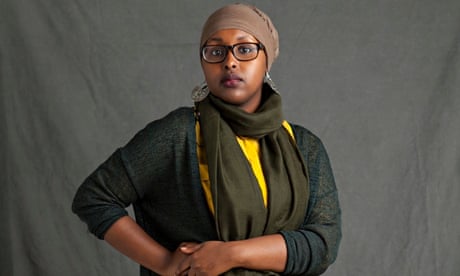 By Corinne Jones
By Corinne Jones
Muna Hassan, young anti-FGM campaigner: 'Education about FGM has to happen from a young age.' Photograph: Antonio Olmos for the Observer The young anti-FGM campaigner who told David Cameron to ‘grow a pair’ has helped to get the issue on the political agenda this year See the Observer’s faces of 2014 in full here
here aren’t many teenagers who can say they told the prime minister to “grow a pair” on Newsnight, and got what they wanted as a result. Now 21, campaigner Muna Hassan cringes as she remembers it, shrinking in her cafe seat. “My mum was like: ‘You told David Cameron what?’” Hassan was subsequently grounded – but it was the attention-grabbing moment her campaign needed. “If that comment got people talking about FGM [female genital mutilation] then I really don’t mind, because people who never knew about it are reading up on it now.”
Born in Sweden to Somali parents, Hassan and her family migrated to England when she was eight, settling in Bristol. It was there that she first heard about FGM, aged 13, through local charity Integrate. Doing her own research, she was shocked to discover that the practice was rife in Somalia. “The next day, me and three other girls decided we had to do something. There’s this openness now around FGM, but when we started campaigning, everyone was just like: [she pulls a face of disgust and waves her hands] ‘We don’t wanna know.’”
This has been a pivotal year for getting FGM on the political agenda in Britain. Although the practice, most prevalent in African and Middle Eastern communities, has been outlawed in the UK since the 1980s, FGM has continued to occur, with British ministers ignoring the issue for fear of being deemed culturally insensitive or racist. As Hassan and other campaigners have argued for years, however, FGM is a form of child abuse – race shouldn’t come into it. It was only in March this year that the first prosecutions came about.
In February, Hassan and five others from Integrate (including Fahma Mohamed, the face of the campaign) took a Guardian-backed petition with over 230,000 signatures to the then education secretary Michael Gove, calling for him to remind schools of their duty to teach the risks of FGM. “It was hilariously awkward for all of us because he was just so uncomfortable discussing anything relating to women’s private parts,” Hassan says, laughing at the memory. “One of the girls mentioned vaginas and he went really red!”
How did it feel when he agreed to write to every school in England? “We thought – sending a letter out to all schools, that’s great, but how many will act upon it? As a minister, there’s still so much he could do. It would have been great if he’d agreed to do training for all frontline staff – if all teachers knew to look out for signs of FGM, they could deal with it. Plus, education about FGM has to happen from a young age. That’s our biggest focus now.”
Alongside the petition, presenting at the Department for International Development-hosted Girl Summit in July and the launch of Girl Generation (an African-led anti-FGM movement) in October, Hassan recalls another highlight of her year: “Meeting Malala [Yousafzai, Pakistani schoolgirl turned education activist who won the Nobel peace prize]. That was mind-blowing. I got a call on a Sunday morning saying ‘Get ready, we’ll be at yours in 30 minutes – you’re going to meet Malala,’ and I thought, ‘Am I dreaming?!’” Was she starstruck? “I thought I was going to be, but she’s so natural, and very teenager-y; you forget that she’s an internationally acclaimed activist when you’re with her because she seems so normal and jokes around.” Not unlike Hassan then, whose frequent hand-over-mouth schoolgirl giggling is completely incongruous with her powerfully articulate, no-nonsense approach to discussing gender-based violence.
We meet in a cafe in central London, near to where Hassan is currently living with her aunt while studying for a degree in child development. Hassan still does a lot of work with Integrate, and is looking forward to their conference in Bristol in February next year. “We’ve invited Nicky Morgan [Gove’s successor], who we hope sees FGM like we do – as part of gender-based violence. There’ll be different workshops the entire day about how to teach issues around FGM.”
Talking about the future, Hassan seems optimistic; the naysayers who slowed FGM campaigning a few years ago are now few and far between. “Now if someone says anything [negative] about [our work] it’s more funny than anything. When it’s a man, we’re like: ‘Why are you getting so defensive about vaginas?’” She smiles knowingly. “As soon as you say that, they shut up.”
No comments:
Post a Comment